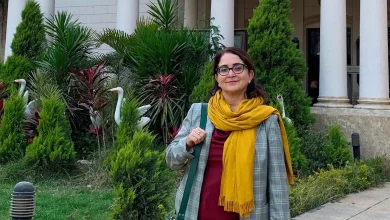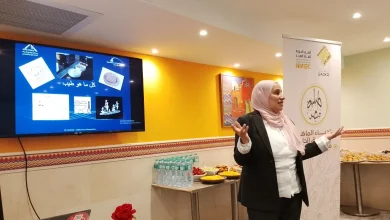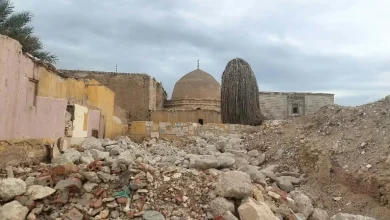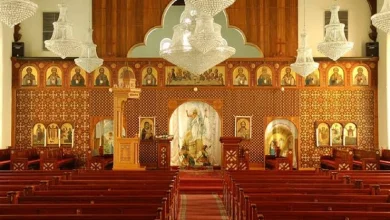Andrew Simon: Egyptians created their popular culture on cassette tapes… and the attack on Popular songs began with Adawiya
When the tapes speak, official history falls silent. With this idea, Andrew Simon opened a different door to understanding popular culture in Egypt. Not all stories are told in official books, nor are all voices captured by microphones. In mass media, Simon listened to the whispers of cassette tapes, to what was hidden in conversations, markets, and the sounds emanating from cars, and to a history that rose from the bottom, rebelling against classifications. This is not just a book about a recording medium, but about a pivotal moment that changed language, taste, and power. In this interview, we meet the author who saw “popular sound” as the key to understanding Egypt with new eyes.
-
Why did you choose the cassette phenomenon as your entry point for understanding the transformations of Egyptian society?
I never intended to write about the history of cassettes in Egypt; the idea came about by chance. It all started with the January 2011 revolution. I was studying Arabic at the American University in downtown Cairo. There, in those days leading up to Mubarak’s fall, I began to understand for the first time the power of sound, the influence of the media, and the hidden politics that inhabit popular culture.
After finishing a scholarship with CASA, I returned to the US and enrolled in a PhD program at Cornell University. I was eager to discover Egypt’s cultural history. I began to delve into certain types of music, the lives of certain artists, and the religious currents that shaped the collective consciousness. The deeper I dug, the more I found the cassette at the heart of the scene.
***
And so began my journey to write the history of this little tape. But the road was not what I expected. While reading old issues of Rose Al-Youssef and Akher Saa magazines, I noticed how cassettes appeared in unexpected places: in advertisements for modern homes, cartoons, newspaper reports on smuggling, and even in daily stories about soccer stars.
These discoveries changed the direction of the book. I was no longer writing about a sound device, but about Egypt itself, at a time when its features were rapidly changing. From this journey emerged my book, Mass Media: The Cassette Culture in Egypt.
-
Badr Al-Rifai is one of the most important figures in translation in Egypt and the Arab world. What was your experience working with him? Did he preserve the spirit of the original text?
I really enjoyed working with Badr Al-Rifai, who is now a close friend. From the beginning, I was grateful for his interest in the story, and over time I came to admire his dedication to conveying the spirit of the book, not just translating it word for word.
For more than ten years, I dreamed of having it translated into Arabic. I hoped that this story would reach readers in Egypt first, and then everyone who reads Arabic everywhere. I was keen for the book to be simple and enjoyable, to be read by those who love music, those who lived through the cassette era, or those who want to see a different side of Egyptian history.
Badr lived through the cassette era and was close to the world the book talks about, which is why working with him was so important and special to me. Working with someone who has lived the experience you are writing about gives the book a different feel.
I would like to add that, in addition to translating Media and the Masses, Badr published his autobiography this year, entitled Longing for the Closed Circuit. I haven’t had a chance to read it yet, but I’m excited to pick it up when I visit Cairo this summer. I would like to learn more about his story, now that he has learned part of mine through his translation of this book.
-
What was the first song you heard in Egypt? Do you have a special experience with cassette tapes?
My first visit to Egypt was in the summer of 2007, and it was the beginning of a series of trips that changed my life. I don’t remember exactly the first song I heard when I arrived, but it was most likely by Amr Diab, as his voice was everywhere, his face was on billboards, and his songs were playing in cars, shops, and even taxis, alongside popular songs and religious speeches.
Although I can’t remember the first song clearly, I do remember the first concert I attended in Cairo during a later visit. I saw the band Wasat Al-Balad perform on stage twice in the same month, and it was an unforgettable experience.
***
As for cassette tapes, there is one moment that sticks in my mind. In the summer of 2015, I was living in Maadi, and there was a small kiosk in front of my apartment called Farghali. One day, I went in to buy a drink and noticed a glass cabinet filled with dusty cassette tapes. I asked the owner, Nasser, who later became my friend, about the tapes. He looked at me in surprise and said, “The cassette era is over!”—as if he couldn’t understand why anyone would be interested in them now.
But to me, those tapes were a story waiting to be told. When I returned to the same kiosk in the summer of 2019, I was surprised to find that the tapes had completely disappeared. I won’t say here what happened to them, but the story of this kiosk and its tapes appears at the beginning and end of the book Media of the Masses. Through it, I invite readers to look with fresh eyes at the ordinary things that surround us—for despite their simplicity, they may hold secrets, memories, and rare details that are worth discovering.
-
How were you able to understand and analyze a culture you didn’t experience yourself? How do you see the role of a foreign researcher in studying a culture that is not their own?
The nicest thing I’ve heard about Mass Media came from Egyptian readers who said they found themselves in this work. For me, as someone who didn’t live through the 1970s and didn’t experience the heyday of cassette culture in Egypt firsthand, these words represent the greatest praise I could receive.
Before I came up with the idea, I spent years studying Arabic. I began in high school in the US, a few years after 9/11, at a time when the Middle East was all over the news but completely misunderstood.
The only talk about it was in the context of terrorism and attacks, with no reference to its history or culture. This reductive approach made me want to learn more about the Middle East, so I chose to learn Arabic and continued my studies at university, where I had the opportunity to travel and study in Yemen and Egypt.
After studying the language in Cairo, I moved there after graduation, where I had a valuable opportunity: to interact with Egyptians from different classes and backgrounds, who opened their homes and hearts to me and made Egypt my second home.
***
These encounters were not just pleasant experiences, but also highly educational. I learned from Egyptians how to live everyday life, what movies are worth watching, what books are worth reading, and what songs are worth listening to. Those moments, simple and profound at the same time, introduced me to a rich and vibrant culture, and I found myself diving into its history later during my graduate studies.
While preparing for the book, I didn’t just rely on conversations and interviews, but also pored over huge numbers of Egyptian magazines published in the last decades of the 20th century, such as Rose Al-Youssef and Akher Saa. These magazines, which covered topics ranging from politics and culture to economics and society, gave me a unique window into the details of Egyptian life as it was lived and written about week after week. Reading dozens of these magazines, issue after issue, deepened my understanding of Egypt’s recent history and gradually transformed what was initially a foreign culture into something familiar.
***
To those who sat with me drinking tea, chatting, and sharing their stories, I say: thank you. Without you, this book would never have seen the light of day. I truly hope that you find yourselves in its pages, as I found myself in your streets, your words, and your songs.
To foreign researchers who wish to study a culture to which they do not belong, I say: learn first from its people, and immerse yourselves in its communities, not from a distance, but through closeness and coexistence. This process cannot be rushed. Learning a new language takes time, and you cannot understand a society deeply without living in it for long enough. Most importantly, talk to people. Communicate. Interact. These exchanges will not only result in better research, but also a more compassionate and humane world.
-
You mentioned the “shadow archive” as a primary source for your research. What attracted you to this archive?
The idea for the “shadow archive” was born in Egypt out of a combination of necessity and imagination. On the one hand, one of the reasons for the abundance of books on Egypt in the first half of the 20th century and the scarcity of books on its recent history lies in the nature of the Egyptian national archive, where records documenting the period after the fall of the monarchy remain inaccessible to researchers. Faced with this challenge, one of the questions I posed in Media and the Masses was: How can the history of a nation be written without its national archive?
In an effort to overcome this absence, I turned to what I call Egypt’s “shadow archive”—the scattered fabric of official and unofficial places, from the paper market in Azbakeya to the opera library to cassette shops and other spaces that thrive in the shadow of the hidden national archive.
***
But the “shadow archive” was not born solely out of necessity. It is also a fertile space that allows new stories about the past to be told that would never have seen the light of day in official contexts. Even if state records were available to document the recent past, we would rarely find the stories I convey in the popular media — conversations about noise pollution, the “death of public taste,” images of the “modern home,” details of a day in the life of an athlete, debates about copyright and leisure time — topics that would not have been considered worthy of preservation or official documentation.
The Shadow Archive is therefore not only a practical solution to a gap in historical narrative, but also an invitation to reimagine the past in light of the present. I am very excited to see what new stories this archive will bring us, and who will be the ones to write them.
- How did the experience of the “suitcase traders” influence the spread of cassette players and the culture associated with them?
In the 1970s and 1980s, Egypt experienced unprecedented mobility, with more Egyptians traveling abroad than ever before. Fueled by the oil boom, temporary migration became commonplace, and air travel in the Middle East boomed to become the fastest growing in the world. Once abroad, Egyptians did not just send money home, they also bought a variety of consumer goods, which they brought back with them to cities and villages across Egypt.
Among the most popular of these goods were cassette players, which quickly became a feature of the “modern home” in Egypt—a home whose modernity was no longer measured by the education of its inhabitants, but by the appliances and gadgets they owned. Among those who bought cassette players and brought them across the national border were the so-called “suitcase traders,” who took advantage of the flexible import policies of the era of openness to bring in huge quantities of consumer goods from abroad and sell them in Egypt.
***
They were joined by the “suitcase carriers,” men and women who worked under the supervision of the suitcase traders. Their job was to transport boxes and bags filled with goods from the docks of international ports and deliver them to middlemen inside Egypt to be sold for profit.
In this way, suitcase traders and suitcase carriers together contributed to the spread of cassette culture in Egypt, a culture that has its roots, in part, in a cross-border movement involving individuals and technologies, in which sounds and goods moved as freely as dreams.
-
During your research on cassettes, did your view of music change?
During my research journey, I came to an important realization: music occupies a central place in understanding history and the past. Despite the important place music occupies in our daily lives—whether through the songs we sing, remember, enjoy, or even criticize—it often remains marginal in much of historical writing. When music does feature in these narratives, it mostly serves to reinforce what we already know about the past. For example, scholars might cite a song by Abdel Halim Hafez to underscore the significant influence of Gamal Abdel Nasser.
But my experience studying cassette culture in Egypt has taught me that music and those who perform it have a real power to reshape our understanding of the past in profound ways. A critical look at the work of Ahmed Adawiya, for example, reveals aspects of cultural politics during the period of openness, while delving into the experience of Sheikh Imam raises questions about the official narratives promoted by the state. In both cases, and many others, music becomes more than just a simple narrative element; it is a key to understanding the past and expanding our perceptions of people’s sensory and cultural worlds, whether in Egypt or elsewhere in the world.
-
In the book, you focus on the relationship between cassettes and the transformation of popular culture. Do you think this transformation stems from technology or from the social classes that embraced it?
Whether it’s cars or the internet, technology remains a tool that can be used in different ways depending on who owns it and their various goals. Similarly, it wasn’t cassette tapes that changed Egyptian culture on their own, but rather Egyptians from all walks of life who recorded, copied, and distributed them who reshaped popular culture through them.
Thanks to their portability, low cost, and ease of use, cassette tapes were a highly sought-after commodity during the oil boom and economic liberalization. In that era of rapid social and economic change, many Egyptians bought cassette players from countries such as Libya, Iraq, and the Gulf states, while international companies facilitated their availability in Egyptian markets through their local agents. With the spread of mass consumer culture, cassette culture also expanded in Egypt.
***
Cassette tapes became a symbol of the “modern home” and gave many people the opportunity to record their voices and share them with others. Popular culture was no longer the preserve of official initiatives such as “mass culture” or state-controlled media such as Egyptian radio. Instead, it became an open field that allowed anyone to be a producer and active participant, thanks to these tapes that carried the voices of both state-approved stars such as Umm Kulthum and singers who challenged the authorities such as Sheikh Imam.
Thus, the impact of cassette tapes in Egypt was not merely a result of the technology itself, but rather the fruit of the power of the people who used it, as cultural consumers became producers and distributors, turning culture into something vibrant and ever-renewing.
Book cover

-
Mass media showed how culture was produced from the bottom up. Do you think the internet has played the same role today?
Among the ideas I was keen to highlight in Mass Media was how cassette tapes were the internet before the internet itself. Before social media platforms such as Facebook, Twitter, and TikTok invaded our lives, cassette tapes and cassette players enabled large numbers of people to create culture, transmit information, and confront ruling regimes. Against this historical backdrop, I came to see the internet as a natural extension of the cassette, a new chapter in a long story whose origins I sought to uncover in the book.
Today, the internet is no longer as limited as the cassette; a video posted in Egypt can spread at tremendous speed and reach a global audience in minutes. However, just as cassette tapes suffered from censorship, the internet has not been spared from practices of blocking and deleting content, where digital material is deleted and users are blocked from accessing certain websites. Thus, the battle over who owns the right to create culture continues: is it solely the consumer, or the producer who creates and manufactures?
***
Nevertheless, there is a surprising connection between the internet and cassettes today. At a time when the traces of cassette culture are fading around the world, some are making serious attempts to preserve these recordings through specialized digital archives.
For example, the Syrian Cassette Archive documents cultural productions while challenging stereotypical images of the Middle East.
Technologies do not exist in isolation from one another, nor do they completely replace their predecessors; rather, they overlap and intersect in many ways. By studying these connections, we learn more and challenge the idea of “newness” that surrounds new media such as the internet.
-
“The audiences of the 1970s took the initiative away from the guardians of culture.” Do you think what happened was a cultural revolution?
When people think of cassette tapes and the Middle East, their thoughts immediately turn to the Iranian Revolution of 1979, when Khomeini’s voice reached a wide audience through these audio tapes. However, cassette tapes, cassette players, and their diverse users played an important role in sparking a second revolution in Egypt, a true cultural revolution.
In my book Media of the Masses, I trace how this ordinary technology and its users had an extraordinary impact, changing the ways in which culture was produced and circulated. This was at a time when local gatekeepers were trying to control the form of Egyptian culture and who had the right to produce it.
-
Do you think there is a particular song that encapsulates the essence of cassette culture in Egypt?
It’s hard to pick just one song. But the one that comes to mind is the recording I discuss at length in the book: “Nixon Baba.” Written by Ahmed Fouad Negm and sung by Sheikh Imam, it was a satirical response to US President Richard Nixon’s visit to Egypt in the summer of 1974. President Sadat welcomed him with great fanfare, presenting him to the media as a historic visitor at a “great” moment for the Egyptian state.
But “Nixon Baba” did not follow this official line, seeking instead to undermine the celebratory narrative promoted by the state. In the song, the visit was not an occasion for celebration, but rather a subject for ridicule. In a striking moment, Sheikh Imam likens the lavish reception to a wedding, with Nixon as the groom, accepted as a last resort after all other options have been exhausted. Imam refuses to welcome him, not out of ignorance, but out of a keen awareness of his tainted political history, referring to the Watergate scandal that was rocking Washington at the time.
***
As expected, this song was not broadcast on Egyptian radio, which was subject to state censorship. Instead, it found its way to the public through non-commercial cassette tapes, recorded, copied, and distributed by ordinary individuals, far from the soundproof recording studios. Despite the passage of time and Nixon’s resignation, and Sadat’s desire to turn the page on that event, “Nixon Baba” remained present, influencing popular memory and forming a counter-narrative to that event. Despite Sadat’s desire to turn the page on that event, “Nixon Baba” remained present, influencing the popular memory and forming a counter-narrative to that moment.
The song, once part of a counter-archive confined to cassette tapes, has become widely circulated online. It highlights the power of the cassette as a cultural medium capable of producing narratives and expanding their circulation. It also shows how a simple tape can be a new window on the past, inviting us to reimagine what we thought we knew and took for granted. In this context, Nixon Baba embodies the essence of cassette culture in Egypt and the alternative perspectives and new meanings it can offer us about history.
-
You mentioned that Muharram Fouad called for the establishment of a cassette industry chamber, with a major artist as an advisor, to crack down on what he considered artistic vulgarity. Do you see his stance as reflecting a conflict between two generations or as an expression of legitimate concern about the deterioration of public taste? Can his stance be compared to the current attitude toward festival stars?
One of the things I tried to highlight in the book is that attacks on festival stars in Egypt are nothing new. Debates about the so-called death of public taste have been going on for decades, and their roots can be traced back at least to the days of Ahmed Adawiya and the stars of popular song in the 1970s, when cassette tapes allowed anyone to be a producer of culture, and voices were raised criticizing what they described as the pollution of taste and the decline of music.
But what I want to emphasize is that these debates are not only about aesthetics or artistry, but reveal a deeper conflict: Who has the right to shape Egyptian culture? And what form should it take in times of rapid change? Whether in the case of Muharram Fouad or Hani Shaker, attempts to control the features of culture have been repeated, but they have mostly been unsuccessful. Culture, after all, does not belong to a particular individual, class, or group, but to everyone.
-
The book caused a stir in Egypt after it was translated into Arabic. How do you view the reactions? Did you feel that Egyptian readers brought new perspectives to the book?
After more than a decade of working on Mass Media, it still feels like a dream to finally see it published in Arabic. What makes me happiest is the response from Egyptian readers: the reviews I’ve received, the posts on social media, and the photos people have sent me of themselves holding the book.All of this means more to me than words can express.
Whether I see the book featured on an episode of Al-Dahik about Ahmed Adawiya, an artist whose influence I explored in depth during my research, or in the pages of Akher Saa magazine, which I followed closely while working on the book, I am indescribably happy that this story is reaching readers from different backgrounds and generations.
What makes me even prouder is hearing from people who lived through the cassette culture era in Egypt that the book has succeeded in capturing the spirit of the time—a time I did not experience myself. To be praised by those who lived through that period is the highest honor I could ever receive.
***
Two years ago, I had the opportunity to share some stories from the mass media with a local audience in Egypt. I still remember those encounters to this day, not for what I said, but for the wonderful stories the audience shared about the meaning of cassette tapes in their lives.
Next August, I will return to Egypt to continue my research, reconnect with old friends, and discuss the Arabic translation of the book. I am very excited to continue learning from the Egyptians, who have made Egypt my second home and have always been generous with their time and culture.
Today, I feel more motivated than ever to explore new chapters of Egypt’s history and write about them in a way that appeals to Egyptian readers and touches their hearts.
-
After the success of the book, do you have any future plans to tackle Egyptian figures or phenomena in subsequent books?
Yes, I am currently working on a number of diverse projects.
First and foremost, I am writing a biography of Sheikh Imam, in which I review his life and artistic legacy. This project not only aims to revisit the modern Middle East, but also to reflect on how history is written and contribute to broader discussions about music, misinformation, and the politics inherent in popular culture.
This book relies heavily on oral history, so if any readers have stories or memories of Sheikh Imam, please do not hesitate to contact me via my website: andrewgsimon.com. I would be delighted to hear from you.
In addition to Mass Media, I am editing a collective book on the role of media in the history of the Middle East from the Ottoman era to the present day. The book includes studies on print, audio, visual, and digital culture. It will cover a variety of technologies, from the telegraph to social media, revealing the cultural richness that has characterized this region throughout the ages.
***
Just as I hoped that my first book would be available in Arabic, I hope that these new works—the biography and the anthology—will be translated into Arabic to reach a wider audience.
Finally, I am working on making my personal archive of cassette recordings available on an open digital platform. This will allow anyone to access, listen to, and interact with them. The aim of this project is to document Egyptian culture and disseminate it globally in a way that preserves and revives it.
If you would like to follow these projects or learn more, you can find me on Twitter or Blusky (@simongandrew), where I regularly share excerpts from my research, my teaching experience, and my travels.
Read also
“Refuge of the People”: Did Refugee Migration Shape Ancient Egyptian Civilization?






Hi, this is a comment.
To get started with moderating, editing, and deleting comments, please visit the Comments screen in the dashboard.